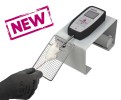Authors
HW Kim, JA Shin, HJ Kim et al
Lab
Department of Pharmacology, College of Medicine, Ewha Womans University, Seoul, Republic of Korea.
Journal
Brain Research
Abstract
Ischemic preconditioning (IP) reduces brain damage after subsequent ischemic strokes by activating endogenous protective mechanisms in rodents. Transient ischemic attack (TIA) induces tolerance in the human brain after ischemic strokes; defining mechanisms of IP effects may provide therapeutic targets to improve recovery of patients with ischemic strokes. Iron transported across the bloodÐbrain barrier (BBB) is required for brain functions, including myelination, and its levels should be finely regulated to avoid harmful effects. This study aimed to determine whether IP enhances repair processes by modulating iron metabolism during the post-stroke chronic phase. Male mice were divided into sham and IP groups, and IP was induced 24 h before a transient focal ischemic stroke. Sensorimotor recovery was observed over 8 weeks after the stroke, and brain volumes and levels of proteins related to repair processes and iron metabolism in the ischemic brains were examined 8 weeks after the stroke. There was significantly less ischemic brain atrophy in the IP group than in the sham group, with no differences in sensorimotor recovery between the groups. Levels of tight junction proteins of BBB, neurites outgrowth markers, and myelin sheath proteins and markers for mature oligodendrocytes were significantly increased in the IP group. Iron import proteins, transferrin receptor 1 and DMT1, were also increased in the IP group. These results indicate that IP increases brain repair processes and iron uptake during the chronic phase after an ischemic stroke, and provide new insights to understand the molecular mechanisms of TIA effects on post-stroke recovery.
BIOSEB Instruments Used:
Grip strength test (BIO-GS3)

 Pain - Thermal Allodynia / Hyperalgesia
Pain - Thermal Allodynia / Hyperalgesia Pain - Spontaneous Pain - Postural Deficit
Pain - Spontaneous Pain - Postural Deficit Pain - Mechanical Allodynia / Hyperalgesia
Pain - Mechanical Allodynia / Hyperalgesia Learning/Memory - Attention - Addiction
Learning/Memory - Attention - Addiction Physiology & Respiratory Research
Physiology & Respiratory Research
 Pain
Pain Central Nervous System (CNS)
Central Nervous System (CNS) Neurodegeneration
Neurodegeneration Sensory system
Sensory system Motor control
Motor control Mood Disorders
Mood Disorders Other disorders
Other disorders Muscular system
Muscular system Joints
Joints Metabolism
Metabolism Cross-disciplinary subjects
Cross-disciplinary subjects Preclinical studies and opioids: role in crisis management in the United States
Preclinical studies and opioids: role in crisis management in the United States 